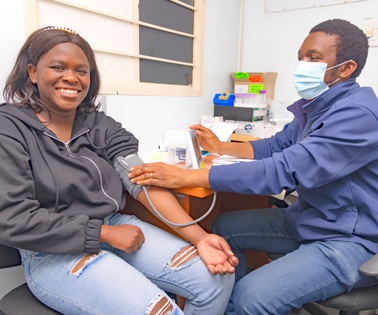June 30, 2023
IAVI launches multisite study with adolescent girls and young women to evaluate vaccine and antibody candidates for HIV prevention in sub-Saharan Africa
First participants for the Multisite Adolescent Girls and Young Women study screened at the Centre for Family Health Research in Zambia.
IAVI has announced the enrolment of the first 29 participants for the Multisite Adolescent Girls and Young Women (MAGY) study at the Centre for Family Health Research in Zambia (CFHRZ). Over the next three years, the MAGY study will collect and analyze a wide range of data from African adolescent girls and young women (AGYW) volunteers to inform the development of HIV prevention products.
 Manase Mapendere checking Nokutula Zimba’s blood pressure at Aurum Institute in Tembisa, South Africa. Credit: Mwangi Kirubi/IAVI
Manase Mapendere checking Nokutula Zimba’s blood pressure at Aurum Institute in Tembisa, South Africa. Credit: Mwangi Kirubi/IAVI
“Despite substantial efforts, new HIV infections among AGYW in sub-Saharan Africa remain significantly high. The MAGY study will aid us in understanding whether new approaches for the development of HIV vaccines are applicable to this population given their vulnerability,” commented Monica Kuteesa, M.D., Ph.D., director of epidemiology at IAVI and co-chief investigator for the MAGY study.
MAGY is a collaboration among IAVI, CFHRZ, the UVRI-IAVI HIV Vaccine Program in Uganda; KAVI Institute of Clinical Research, Kenya; the Aurum Institute in Rustenburg, South Africa; the Population Council; and the University of Manitoba. The study is funded through the Accelerate the Development of Vaccines and New Technologies to Combat the AIDS Epidemic (ADVANCE) program, a 10-year cooperative agreement between IAVI and the U.S. Agency for International Development (USAID) through the U.S. President’s Emergency Plan for AIDS Relief (PEPFAR). The goal of ADVANCE is to ensure safe and globally effective HIV vaccine and biomedical prevention products are developed by African and Indian leaders.
“This marks a significant milestone for our research team as we strive to better comprehend the vulnerabilities and unique needs of AGYW in our communities. Our hope is to develop interventions that can help prevent HIV infections among this vulnerable population,” said William Kilembe, M.D., MSc, project director of CFHRZ.
HIV/AIDS has been an ongoing global health crisis for the past four decades. AGYW from sub-Saharan Africa, aged 15-24 years, face a higher risk of acquiring HIV compared to their male counterparts of the same age. This risk is linked to interconnected biological, behavioral, and structural factors. The MAGY study is part of IAVI’s larger initiative to develop broadly neutralizing antibodies (bnAbs) that would be necessary for the development of an HIV vaccine that is protective against a wide spectrum of HIV viruses.
MAGY aims to establish AGYW cohorts that will be prepared to participate in clinical trials to evaluate enhanced broadly neutralizing antibodies as a long-lasting injectable HIV prevention product. It will also assess and predict the suitability of HIV vaccine candidates for AGYW. MAGY will enroll 1,200 AGYW who meet eligibility criteria to participate through quarterly clinic visits scheduled over a 36-month period.
The MAGY study will be conducted in compliance with all relevant regulatory and ethical standards, overseen by a team of experienced scientific researchers. The study emphasizes community-driven participation, with meaningful involvement of AGYW in concept development study implementation, and dissemination. By understanding the unique needs and vulnerabilities of the AGYW population, researchers hope to develop targeted interventions and ultimately improve global health outcomes.